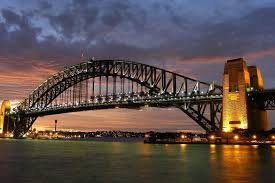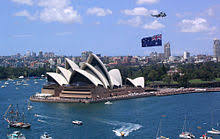In the country of antipodes (part 3)
 A curious story of the origin of the name of the kangaroo, possibly mythical. James Cook, who “discovered” Australia a second time, wrote in his diary in 1770 about a “strange creature that gallops on its hind legs like a jumping mouse.” He asked the natives what the name of this strange creature is called. Those answered: “Ken ge roo.” From here came the name of these animals, which became the symbol of Australia. And already modern linguists have established that in the language of the natives this expression meant: “I do not understand you.”
A curious story of the origin of the name of the kangaroo, possibly mythical. James Cook, who “discovered” Australia a second time, wrote in his diary in 1770 about a “strange creature that gallops on its hind legs like a jumping mouse.” He asked the natives what the name of this strange creature is called. Those answered: “Ken ge roo.” From here came the name of these animals, which became the symbol of Australia. And already modern linguists have established that in the language of the natives this expression meant: “I do not understand you.”
European settlers in Australia soon became convinced that the kangaroo had not only tasty meat, but also a valuable skin, from which beautiful and durable products could be made. Four species of kangaroos since the settlement of the Fifth continent have been completely exterminated. Between 1870 and 1917, 26 million animals were killed. In essence, it was a real genocide, transferred to the animal world!
These animals had many problems at a later time. More recently, any hunter in Australia could have killed as many kangaroos as he wanted. However, now many of their species, which are on the verge of extinction, are listed in the Red Book. Nevertheless, disputes about the permissible balance in nature continue. In 1983, the Australian government, meeting the demands of farmers, allowed the killing of two million of the 19 million kangaroos that were in the country at that time.
Farmers complained that these animals became the scourge of agriculture. They won the best pastures from sheep and cattle, destroyed crops, destroyed hedges. Discussions on this topic, apparently, will continue in the future, but the leadership of the Australian Fund for the Protection of Animals firmly announced: “Kangaroos should not be sacrificed to business.”
Stubborn from Norfolk Island
In 1991, residents of Norfolk Island, located east of mainland Australia, held a referendum at the initiative of their legislature. The question was to be answered: do the islanders want to change the nature of their relationship with the mainland?
The fact is that Norfolk has the official status of a self-governing overseas federation called the Australian Union. The need for a referendum arose because the special subcommittee of the House of Representatives of the Federal Parliament, sitting in Canberra, carefully studied the structure of local legislative bodies and the laws adopted by him for three years, wanting to establish how they comply with the rules and practice of mainland Australia. It turned out that not very, and this worried the central government.
Among the projects submitted for discussion by parliamentarians in Canberra, the main one was the proposal to extend to Norfolk a nationwide tax and social security system, which the islanders really did not like.
In order to understand the specific mindset of the inhabitants of Norfolk, you need to take a short excursion into history. The island was originally inhabited by exiled rebels from the legendary Bounty ship. In 1856 they were transported further to Pitcairn Island, and Norfolk, which retained the rebellious spirit of its founding fathers, remained a self-governing British colony until 1896. The island was then controlled by the administration in Sydney, and later it moved to Canberra, the capital of the federal Australian states. And in 1874, the federal parliament gave Norfolk “free” – allowed its residents to have their own legislative body and independently manage finances. All this has borne fruit.
The islanders developed their own tax system, thought out how to organize social security and health care most rationally. In short, they lived their own minds. As a result, taxes are two times lower than on the mainland. Business on the island is profitable, and what happens infrequently, the public sector is also quite profitable. Which allows both to take due care of the population.
It so happened that if mainland Australia dreams of creditors at night who owe the country far over $ 100 billion, then Norfolk has no external debt at all. Is it any wonder that during the referendum 100% of the adult population came to the ballot boxes. And this is about a thousand people, of whom 788 strongly supported the preservation of the status quo for Norfolk. No change, the descendants of the Bounty rebels said. Leave us alone, us and so good.
By the way, still.




